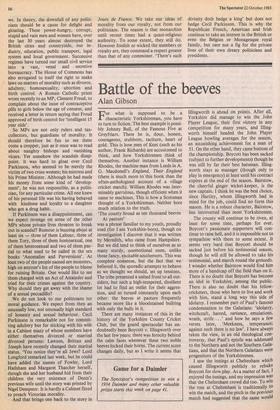Liaisons dangereuses
Richard West
rr he French newspapers scarcely
mentioned the resignation of Cecil Parkinson; and Frenchmen generally, so we were told by Mr Sam White in the Stan- dard, could not see why we were interested in the adultery of a cabinet minister. In France such affairs are not a matter of public concern; and French law prohibits invasion of privacy. Once again, we British were made to feel ashamed of our Anglo- Saxon gaucherie on matters of sex. Here was Mr Parkinson having to grovel before the public because he had gone to bed with his secretary, while over in France the politicians, all men of outstanding charm, good looks, wit, suavity and intelligence would be leaving the Chambre des Deputes for a rapturous interlude, entre 5 et 7, with an understanding mistress, then home to dinner and champagne with an equally understanding wife who herself, perhaps, had a secret liaison with one of her hus- band's understanding colleagues. How unspeakably vulgar and bourgeois we British felt for prying into the secret amours of the famous.
The French took no interest in Cecil
Parkinson, but this does not mean they ig- nore the private life of the British. At the height of the Parkinson rumpus I picked up my wife's copy of fours de France to discover: 'Anne et Mark Phillips: de Nouveaux Nuages'. The rumours of a break have reappeared. 'Has one not just learnt that the only daughter of Queen Elizabeth II has held a long interview with the lawyer who was engaged on the divorce of Princess Margaret and Lord Snowdon? Last year, during their visit to Japan, the Nipponese protocol service proposed to them to share the same bedroom, as Charles and Diana do not deprive themselves of during their voyages. "It is out of the question!" replied, drily, Anne. She even demanded that the bedroom of Mark should be sufficiently distant from hers. Yet Anne has not truly a dry heart. Those who know her say: "Often, when one asks her where is Mark, her eyes fill with tears." And so on, over four pages, with pictures.
The French have an appetite for reading about the private lives of the famous; but not about politicians. Nor, I suspect, do we. In theory, the downfall of any politi- cians should be a cause for delight and gloating. These power-hungry, corrupt, stupid and vain men and women have, over the last 30 years almost destroyed the British cities and countryside, our in- dustry, education, public transport, legal system and local government. Successive regimes have turned our small civil service into a vast, venal and secretive bureaucracy. The House of Commons has also arrogated to itself the right to make laws on matters of morality such as divorce, adultery, homosexuality, abortion and birth control. A Roman Catholic priest wrote recently to an MP, Clement Freud, to complain about the issue of contraceptive pills to girls below the age of consent, and received a letter in return saying that Freud approved of birth control for 'intelligent 15 year olds'.
So MPs are not only rulers and tax- collectors, but guardians of morality. It should therefore be fun to see them come a cropper, just as it once was to read about naughty bishops and vanishing vicars. Yet somehow the scandals disap- point. It was hard to gloat over Cecil Parkinson, who seemed to be merely the victim of two cross women; his mistress and his Prime Minister. Although he had made his money from some kind of 'develop- ment', he was not responsible, as a politi- cian, for any particular crime. All one knew of his personal life was his having behaved with kindness and loyalty to a daughter who got a drug habit.
If Parkinson was a disappointment, can we expect revenge on some of the other MPs whose private lives threaten to break out in scandal? Rumour is buzzing about at least six — three of them Labour, three of them Tory, three of them homosexual, one of them heterosexual and two of them par- tial to what used to be called in the sex books 'Anomalies and Perversions'. At least two of the people named are monsters, high on anyone's list of the people to blame for ruining Britain. One would like to see them charged with an Act of Attainder and tried for their crimes against the country. Why should they get away with the shame of a sexual peccadillo?
We do not look to our politicians tor moral guidance. We expect from then an unusually low, not unusually high standard of honesty and sexual behaviour. Cecil Parkinson is remarkable not for commit- ting adultery but for sticking with his wife in a Cabinet many of whose members have either themselves divorced or married divorced persons: Lawson, Brittan and Joseph have recently changed their marital status. 'You notice they're all Jews? Lord Longford remarked last week, but he could have added the names of Fowler, Lord Hailsham and Margaret Thatcher herself, though she and her husband hid from their children the very existence of Denis's previous wife until the story was printed by Nigel Dempster. It is hardly a Cabinet fitted to preach Victorian morality.
And that brings one back to the story in
fours de France. We take our ideas of morality from our royalty, not from our politicians. The reason is that monarchies until recent times had a quasi-religious authority. To some extent, they still do. However foolish or wicked the members or royalty are, they command a respect greater than that of any commoner. 'There's such
divinity doth hedge a king' but does not hedge Cecil Parkinson. This is why the Republican French, American and Irish continue to take an interest in the British or even the Belgian or Monagesque royal family, but care not a fig for the private lives of their own dreary politicians and presidents.















































 Previous page
Previous page